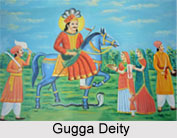 Gugga deity is the folk deity of Rajasthan and the Punjab region. He is worshipped for protection against snake bite. It is said that he was born a Hindu but as per legend he descended into the earth as a Muslim and thus his followers include people from all faiths. He is known as Gogaji in Rajasthan and Gugga Ji in Punjab, Haryana and Himachal Pradesh. His other names are Gugga Pir, Gugga Jaharpir, Gugga Chohan, Gugga Rana and Gugga Vir.
Gugga deity is the folk deity of Rajasthan and the Punjab region. He is worshipped for protection against snake bite. It is said that he was born a Hindu but as per legend he descended into the earth as a Muslim and thus his followers include people from all faiths. He is known as Gogaji in Rajasthan and Gugga Ji in Punjab, Haryana and Himachal Pradesh. His other names are Gugga Pir, Gugga Jaharpir, Gugga Chohan, Gugga Rana and Gugga Vir.
Birth of Gugga Deity
It is believed that Gugga was warrior-king who was born in Dadrewa in the Churu district of present day Rajasthan. He was considered to be a saint who had the power to cure the effects of poison. His father was King Jewar of Dadrewa. His mother Bachhal Devi was the daughter of Rajput ruler, Kanwarpala who in 1173 AD ruled over Sirsa in present day Haryana. As per this, Gugga Ji`s maternal family hails from present day Haryana.
Kingdom of Gugga Deity
Gugga ji ruled over the territory stretching from Hansi near Hissar in present day Haryana to the river Sutlej in Punjab. His legacy in the Punjab state can be noticed in towns such as Bareta Mandi. This town is located at a distance of 51 km from Mansa in Punjab and is predominantly inhabited by Chauhans who trace their origin from Gugga. Some members of the Chauhans claim Gugga Ji to be their ancestor.
Worship of Gugga Deity
Gugga deity is worshipped in several states of northern India including Rajasthan, Punjab, Haryana, Himachal Pradesh and the north western districts of Uttar Pradesh. Many villages of Punjab have a shrine dedicated to Gugga. He is also worshipped in Gujarat and Madhya Pradesh. He is usually worshipped on the ninth day of Bhadon month. The holy place where he is venerated is known as marries. The shrines do not conform to any religion. They can range from antholes to structures that resemble a Gurdwara or a Mosque. The devotees offer noodles to Gugga ji and also leave them in places where snakes reside. In Punjab, traditionally the devotees offer sweet Vermicelli and sweet fried bread.



















